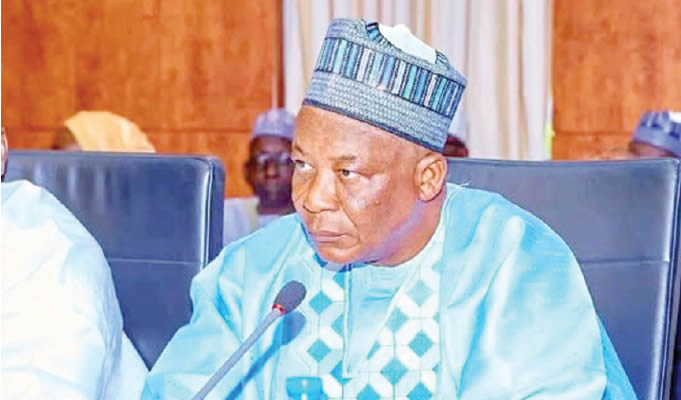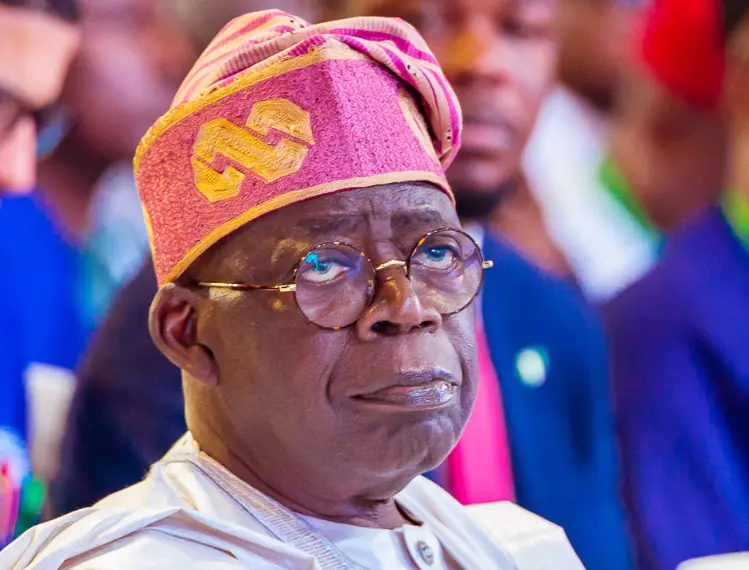
For close to one year now, Taraba State, one of the ethnically complex and poorest states in the North East geopolitical zone of the country, has been without a deputy governor. The lingering absence of Deputy Governor Alhaji Aminu Alkali on account of ill-health has triggered debates over his continued stay in office without being able to perform his duties as the second-highest political office holder in the state.
The deputy governor has not appeared in public for over eight months after he took ill last year. He was first admitted to the National Hospital in Abuja and later flown to Egypt when his health condition worsened.
Governor Agbu Kefas has been running the state without an active deputy whose duties include holding the office of a governor if he (the governor) proceeds on vacation or unable to perform his functions.
Alhaji Aminu’s prolonged absence on health grounds has raised questions over whether he is still capable to stay in office or should be removed. However, the state executive council which has the constitutional mandate to make pronouncement on the matter has remained silent.
Instead, Governor Kefas had posted Mr Emmanuel Lawson, a deputy chief of staff in his office, to oversee the office of the deputy governor.
In a letter dated July 1, 2027, signed by the Secretary to the State Government (SSG), Barr. Gebon T. Kataps, Mr Lawson was told that the appointment was with immediate effect.
“The posting is to ensure effectiveness of governance and articulation of government policies and programmes emanating from the purview of the office of the deputy governor,” the letter read.
Daily Trust reports that since the announcement of the posting of Lawson, there have been suggestions in Jalingo that the motive was for him to “act as the deputy governor,” with some observers saying the governor, who leads the state executive council, ought to have used stipulated laws to resolve the agitations over the long absence of the deputy governor.
Some of those who spoke said it was a nullity for Mr Lawson to run the office of the deputy governor, considering that he was not elected and as an employee, and that his role should have been to assist the ailing deputy governor in discharging his duties whenever he is around.
However, in an interview with one of our correspondents, yesterday, Emmanuel Bello, who is the spokesman of Governor Kefas, said the posting of Mr Lawson was “simply an administrative matter.”
According to him, “He was not posted to replace the deputy governor and most importantly, the deputy governor is recuperating.”
When told that there are reports that the deputy governor was incapacitated, Bello said, “What I can tell you is that he is recuperating and his condition hasn’t reached a stage that people should be calling for his removal. There is no constitutional crisis at all.”
A source close to the governor disclosed that Kefas had been receiving calls from various quarters to transmit a letter to the House of Assembly declaring his deputy incapacitated to pave the way for his removal.
“The governor believes that if the health situation of the deputy is such that he can recover to assume his office, there is no need to remove him, after all, he (the deputy governor) did not deliberately bring the sickness on himself,” the source added.
Political expediency
Yet, beneath the surface lies a delicate political calculation. According to insiders, there have been speculations that if the deputy governor were to be removed, the Deputy Speaker of the State Assembly, Hon. Hamman Adama, who is from the Central Zone, would be considered as a possible replacement. However, this option threatens to upend Taraba’s current power-sharing balance.
“If the Deputy Speaker, who is from the Central Zone, is elevated as deputy governor, then the Secretary to the State Government (SSG), Gebon Timothy Kataps, who is also from the Central Zone, would have to be dropped to maintain the zoning equilibrium,” the source explained.
This potential reshuffling has reportedly created significant hesitation in taking a decision on removing the deputy governor. “There’s a lot of politics involved,” the source said. “They at some point wanted to follow due process by sending a request to the Assembly to declare the deputy governor incapacitated, but when they realised it would cause an imbalance and potentially cost the Central Zone the SSG position, they pulled back,” the source added.
Another insider familiar with the matter said there was a move by the Taraba State House of Assembly to begin the process of the removal of the deputy governor.
He said the issue was listed among matters on the Order Paper for deliberation recently, but the information was prematurely leaked and began to trend on the social media, forcing those involved to put the process on hold.
The source further said that influential political stakeholders including those considered as the political godfathers of the state, have reportedly endorsed the Deputy Speaker as replacement to the deputy governor.
Taraba not new to stalemate
The handling of the Taraba deputy governor’s political fate seems to follow a similar antecedent set during the administration of late Governor Danbaba Suntai of Taraba, who was involved in a near-fatal plane crash near Yola, Adamawa State, while flying a private aircraft with some of his aides.
Following the crash, Taraba State was thrown into political uncertainty. Section 190 of the Constitution stipulates that a governor who is unable to perform the functions of his office must transmit a letter to the State House of Assembly, empowering the deputy to act as governor. However, no such letter was transmitted in the early days of Suntai’s absence.
This led to a prolonged power vacuum. For months, Deputy Governor Garba Umar, who was expected to take over in acting capacity, remained largely sidelined, unable to fully exercise the powers of the office. The political elite around Suntai, particularly a powerful inner circle including his family members, aides, commissioners, and loyalists resisted any attempt to formally cede control. They allegedly exploited the constitutional ambiguity around incapacitation and transmission of power, shielding information about Suntai’s true medical condition while running the state by proxy.
In August 2013, after nearly 10 months abroad, Suntai was flown back to Nigeria in what many observers believed was a political manoeuvre to forestall any move by the House of Assembly to declare him unfit to continue in office. His return, rather than douse tension, ignited fresh controversies.
Despite clear signs that he was still not fully recovered, Suntai was said to have transmitted a letter to the Taraba State House of Assembly stating that he was ready to resume work.
The House, unconvinced by the circumstances, set up a medical panel to assess his fitness, but political allies of the governor pushed back, insisting he had resumed office. This led to a fierce power tussle between the governor’s loyalists and supporters of Acting Governor Garba Umar.
At one point, Taraba effectively had two parallel administrations, with both camps issuing conflicting directives. The state executive council became deeply polarised. While some commissioners pledged allegiance to Umar, others refused to recognise him. The crisis drew national attention, and despite calls for intervention, the then federal government under President Goodluck Jonathan was largely indifferent.
Eventually, Suntai’s condition did not improve enough for a full resumption of duties, and the House of Assembly formally empowered Garba Umar as Acting Governor. However, even this resolution came after protracted delays and intense behind-the-scenes political manoeuvrings.
Lawyers disagree over possible removal
A human rights lawyer and former President of the Committee for the Defence of Human Rights (CDHR), Barrister Malachy Ugwumadu, said in the interest of the people, it was time the state executive council in Taraba activated Section 189 of the Constitution to determine the capacity or otherwise of the deputy governor to remain office.
He said, “No one prays for ill-health, but when it happens, don’t be too emotional about it because the condition of your health as a governor or deputy governor is proportional to the well-being of the citizens of the state. The state of infirmity should naturally activate the right of the executive arm of government through a two-thirds resolution to empanel a medical team to verify the deputy governor’s health status.
“To ensure that the process is not recklessly done, the constitution requires that one of the members of the medical panel must be a personal physician to the person involved. The people of Taraba State must take proactive steps to put pressure on the governor to bring about this resolution. It is in the best interest of the people and even the deputy governor, so that he can adequately pay attention to his health.
“People resign when they find that they are no longer fit and proper to discharge functions of their office, but when they refuse as a matter of honour to resign, then it is right to activate the process of the law, which is Section 189.”
But a Senior Advocate of Nigeria, Richard Ahonaruogho, maintained that the offices of the governor and the deputy are intricately tied, noting that it requires due process for either of them to be removed. He said there was no need to initiate the deputy governor’s removal since the health commissioner had said he was recovering.
“It is only the governor and the Speaker of the House of Assembly that can remove the deputy governor if the state medical board certifies that he cannot continue to carry out his function.
Also, the governor can ask any of the commissioners to do his (deputy governor’s) job.
“We should not crucify anyone for falling sick. He can be absent for a year, and the governor has not complained that he cannot do his job. The governor and the state House of Assembly know what to do,” Ahonaruogho said.
Former President of the Nigerian Bar Association (NBA) J.B. Daudu (SAN) submitted that the issue is a matter within the purview and competence of the Taraba State House of Assembly. According to him, only the House has or can have access to the facts, and when they are satisfied that the deputy governor warrants replacement, they will act.
“This is not the first time in the history of the nation that the chief executive of the nation or a state had been rumoured to be gravely ill, and all sorts of demands were made for immediate action. In this case, the alleged incapacitation only affects the office of the deputy governor and not that of the governor. So the office is intact and there is no risk of the administration of the state being thrown into jeopardy or subject to capture by persons not contemplated by the Constitution,” Daudu said.
DAILY TRUST.




